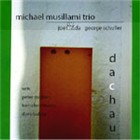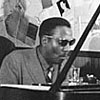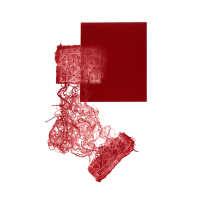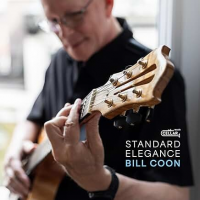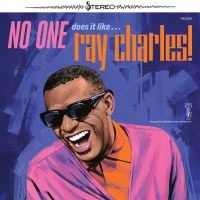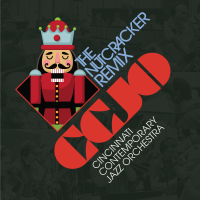Home » Jazz Articles » Album Review » Michael Musillami Trio: Dachau
Michael Musillami Trio: Dachau
Musillami has released a dozen albums under his own name since the label's inception—the kind of output that is only possible with a small and focused independent outfit—with ensembles ranging from duo to octet. Dachau is the second by his working trio with Schuller and bassist Joe Fonda. This time, however, he enlists trumpeter Dave Ballou and labelmates Tom Christensen and pianist Peter Madsen to expand the sonic palette on four of his seven original compositions. By ranging from trio to sextet settings, the album is as much a vehicle for Musillami the conceptualist as it is Musillami the writer and performer.
The trio tracks show just how far the group has come since its 2003 release, Beijing. Musillami's tone may be soft and round, but his lines are often angular—logical extensions of his almost mathematically precise compositions. While he travels in different circles than saxophonist Tim Berne, an inner logic that links the two. Even when Musillami's trio is exploring the outer boundaries of the material, there's always a path—obscure though it might seem—leading back to form. The interplay among the three is so intrinsic that it's not only impossible to tell who is reacting to whom. It's irrelevant.
When the guests are brought in to create denser textures—especially on the sextet title track—the bond between Schuller and Fonda is brought into even greater focus, as is Musillami's clear direction. The twelve-minute "Dachau" traverses considerable terrain with clearly delineated soloists at times, but a more collective approach to its development at others. Madsen is especially on point, here and on "Part Pitbull —which the two originally recorded as a duet—avoiding a more conventional accompanist role during Musillami's solo, instead engaging in interactive conversation.
Musillami's complex world owes a lot to guitarist Joe Diorio—whose book Intervallic Designs pushed a number of known guitarists in new directions, even as Diorio himself has remained almost completely beneath the radar. But Diorio's innovatively anti-linear approach has provided players like Musillami an alternative foundation from which to evolve. Dachau continues to repay the debt, building a musical universe with its own unique lyricism, albeit one of a more oblique design.
Visit Michael Musillami on the web.
Track Listing
Dresden; Archives; Dachau; Part Pitbull; Rottweil; Today the Angels; Metaphor 3.4.5.
Personnel
Michael Musillami
guitarMichael Musillami: guitar; Joe Fonda: bass; George Schuller: drums, bells, shaker, toy hammer whistle. With Peter Madsen: piano on
Album information
Title: Dachau | Year Released: 2005 | Record Label: Playscape Recordings
Tags
PREVIOUS / NEXT
Support All About Jazz
 All About Jazz has been a pillar of jazz since 1995, championing it as an art form and, more importantly, supporting the musicians who make it. Our enduring commitment has made "AAJ" one of the most culturally important websites of its kind, read by hundreds of thousands of fans, musicians and industry figures every month.
All About Jazz has been a pillar of jazz since 1995, championing it as an art form and, more importantly, supporting the musicians who make it. Our enduring commitment has made "AAJ" one of the most culturally important websites of its kind, read by hundreds of thousands of fans, musicians and industry figures every month.


